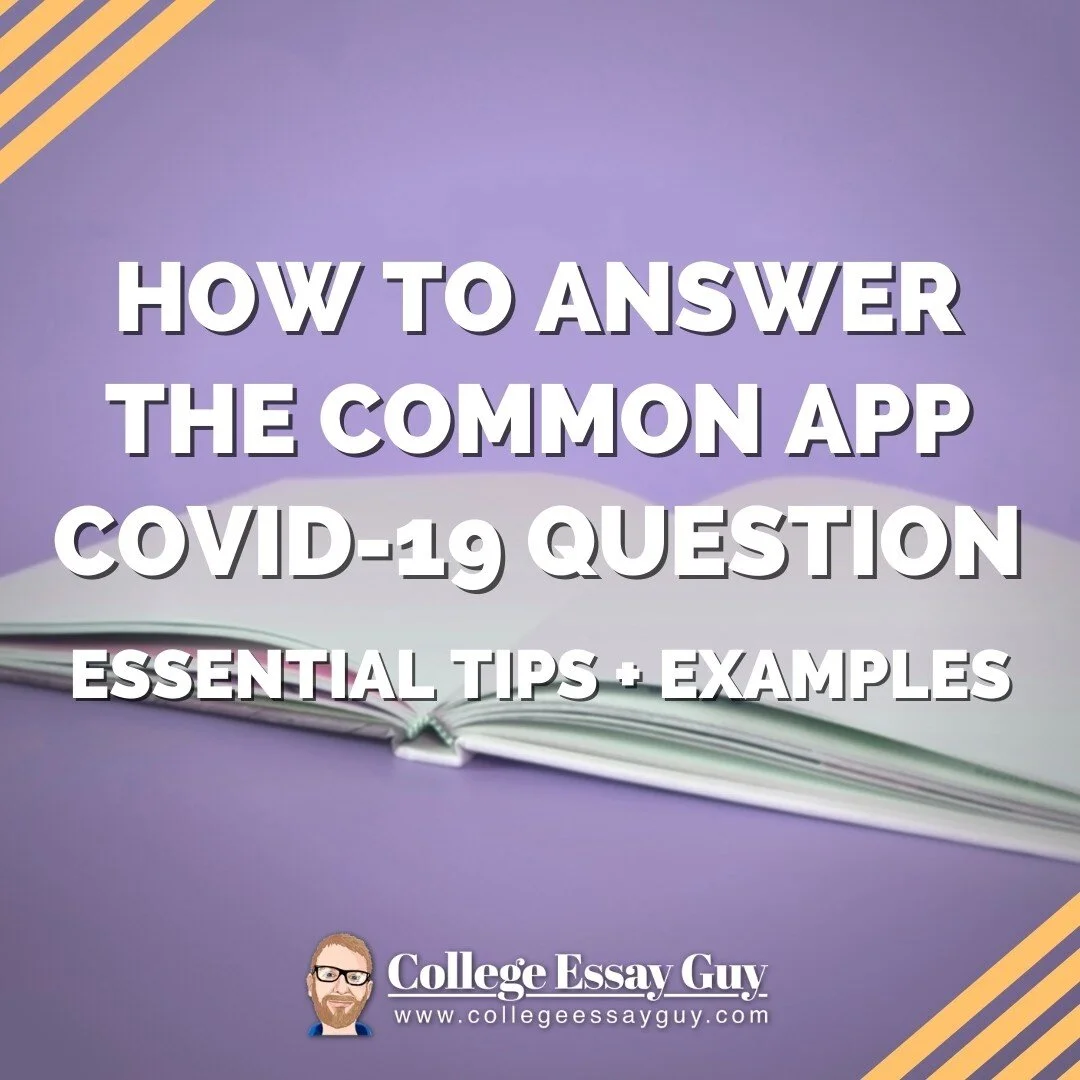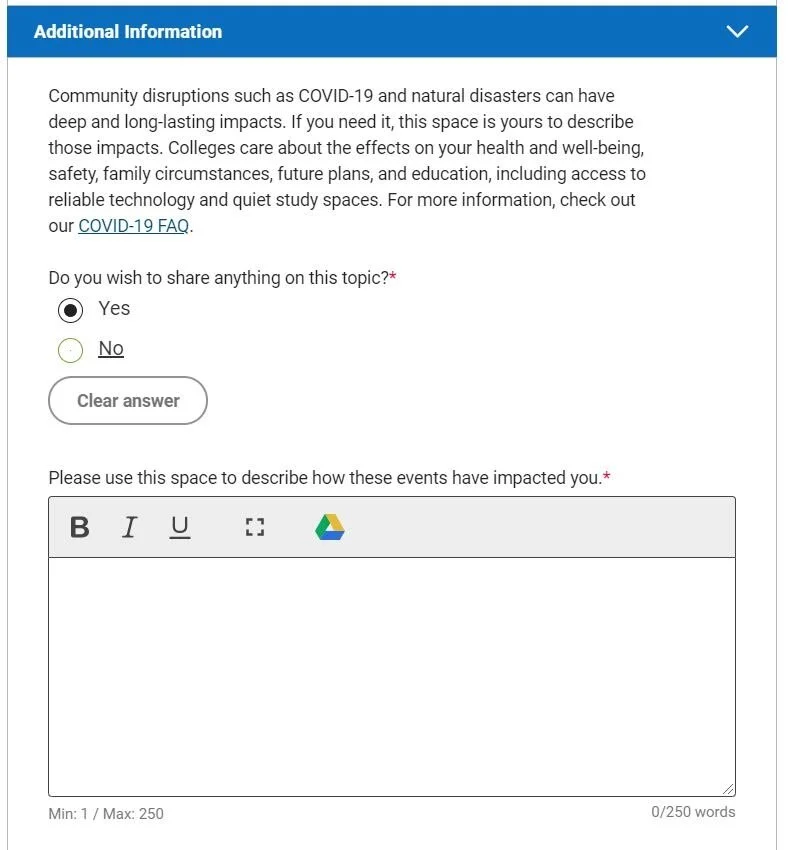What Is the Optional Common App COVID-19 Question?
This year, the Common Application announced it is adding an optional 250-word COVID-19 question in the Additional Information section of its application.
Why? Because the coronavirus pandemic has had a huge impact on pretty much everyone, but Common App didn’t want students to feel that this had to dominate their applications.
So here’s what the Common App added:
We want to provide colleges with the information they need, with the goal of having students answer COVID-19 questions only once while using the rest of the application as they would have before to share their interests and perspectives beyond COVID-19.
I’m underlining that last part to make a point—use this section for COVID-19-related information so you can use the rest of your application for the other values, skills, qualities, and interests that you’ll bring to a college campus.
Here’s a screenshot of how the question actually appears in the Common App:
If you pick “Yes,” you get an optional 250-word section you can use to share more.
Note: If you click on the COVID-19 FAQ, you’ll get some insight into how to potentially use this section. (This was actually kinda buried in the Common App when we searched for it, so you might miss it if you’re not looking carefully.)
Here’s what’s there:
COVID-19 has affected students in dramatically different ways. If you need it, the COVID-19 and natural disaster question in the Additional Information section is a place for you to describe the impact of these events.
The question is not intended to be an extra essay. There’s also no need to describe how your school responded to these events. Your counselor will have an opportunity to discuss impacts like closures, online instruction, and grading policies. Instead, consider how these events may have impacted you, your family, and your learning environment. Examples might include:
-Illness or loss within your family or support network
-Employment or housing disruptions within your family
-Food insecurity
-Toll on mental and emotional health
-New obligations such as part-time work or care for siblings or family members
-Availability of computer or internet access required to continue your studies
-Access to a safe and quiet study space
-A new direction for your major or career interests
11 Potential Uses for the Optional COVID-19 Question
The lingering question: Should you plan to answer the COVID-19 Prompt?
The short answer: if you’ve been impacted by COVID-19 in important ways and feel that colleges should know, then maybe “Yes.”
So how should you answer the Common App COVID Question?
The 8 reasons listed above by the Common App are a great starting point. Here are some examples of each and some tips:
Illness or loss in your family or support network
Examples: Parents or caretakers contracted COVID-19 and couldn’t work, or someone you care about died, and it had an impact on your life or your studies.
Employment or housing disruptions within your family
Examples: You or a family member lost a job; you or your family had to move, or were at risk of having to move; you or your family had to live and work in very close quarters, perhaps sharing a computer.
Food insecurity
Example: Due to money issues, you didn’t have enough money to pay for food.
Toll on mental and emotional health
Tip: You may not want to spend too much time on this one, as it may raise a red flag for the admission officers. If you do mention depression or anxiety, be sure to emphasize what you did about it and what you learned from the experience.
New obligations, such as part-time work or care for siblings or family members
Examples: Perhaps your responsibilities with your siblings increased because your parents’ work situation changed; your grandparents needed extra help with medications, or taking walks.
Availability of computer or internet access required to continue your studies
Examples: Your family of five had to share one laptop, your access to WiFi was unreliable or non-existent, or communication with your teachers was limited.
Access to a safe and quiet study space
Examples: You had to work in the living room, kitchen, or other public family space, and it wasn’t always quiet.
A new direction for your major or career interests
Examples: You took an online course and deepened your interest in law or STEM, or, when a summer opportunity was canceled, you ended up making masks and selling them locally, and this inspired an interest in business.
Frequently Asked Questions (FAQs)
What tone should I use when writing?
Straightforward, informational
Are bullet points okay?
For sure
Should I just say what happened and that’s it?
If you’re writing about challenges you’ve faced, I’d recommend using this simple three-part structure:
Challenge I faced + impacts on me (the second part being crucial, something students often forget to include)
What I did about it
What I learned
Wait, do I have to include something here?
No
Should I use this section even if I didn’t face challenges?
It’s up to you. See examples below.
Can you share a sample COVID-19 section?
Yes. I’ll share two, in fact. One example does emphasize challenges, and the other doesn’t:
If you have faced challenges ...
I recommend using the simple, three-part structure I shared above:
Challenge I faced + impacts on me (the second part being crucial, something students often forget to include)
What I did about it
What I learned
Here’s an example:
I come from a low-income family, and we were not prepared for the challenges the pandemic threw at us: my siblings and I shared one laptop. My brother worked at Panda Express, and we lived in constant fear that we would contract COVID-19. My mother and father, who clean houses together, were unable to work consistently.
We did the best we could to adapt, creating a schedule for laptop use, staying informed about precautionary measures we needed to take, and I helped earn money by taking on a part-time job making and selling our own masks. I also was able to spend more time increasing my activist work by writing postcards to encourage members of my community to vote.
This experience has taught me a lot about flexibility and how important it is to communicate with my family about what I need. I also learned a lot about my own physical and mental health: I prioritized taking walks and making sure I was eating nutritious foods. Finally, I learned that it is possible to eat too many Flaming Hot Cheetos and that Black Mirror is the greatest TV show ever.
If you have not faced too many challenges …
I recommend describing 2-3 skills gained or values developed.
Tip: You can brainstorm skills and values using this list. Then you can describe how you developed them, like this:
Due to the pandemic, my SAT and ACT dates were all canceled (seriously, all of them), as well as my plans to volunteer at our local hospital. As a result, I chose to focus my time on three main areas:
1. Reading: I finally got through the books that had been piling up on my bedside table, including Freakonomics, How to Be an Anti-Racist, and the Watchmen comic book series (highly recommend).
2. Learning: I taught myself some coding basics through a Coursera course, and took an Adobe Photoshop course to learn how to edit photos. I also tried (and failed) to teach myself Korean. But I can now order three items off a Korean menu, order “coffee,” and ask to use the bathroom (if one day I ever get stranded somewhere in Seoul).
3. Grandma time: My grandmother left her nursing home at the start of the pandemic, and we spent a lot of time together. She’s a really important person in my life, and at 95, she’s nearing the end of her life, so I was able to help by making meals, cleaning up, and just listening to her tell stories.
Notice the values (knowledge, curiosity, family). And notice the tone is a little playful. Is that okay? Yes it is.
5 Potential Misuses for the Optional COVID-19 Question
1.) Don’t treat this as a separate essay.
Why? If you read closely, you’ll see that Common App says, “The question is not intended to be an extra essay.” Wait, can you write paragraphs and full sentences? Yes, you can. I just mean that you shouldn’t feel like you have to make this The Greatest Short Essay Ever. Just make sure the information is clear and that we learn either a) what challenges you faced and what their impacts were and/or b) what values and skills you developed.
2.) Don’t spend your time talking about how lucky/privileged/#blessed you are.
We get it: Other people had it worse. If you want to mention that briefly, cool. But no need to talk about all the horrible things that happened/you imagine happened to others and how, relatively speaking, your family had it pretty good. Why? It doesn’t really answer the question, and it doesn’t add much to your application.
Note: I’m including this simply because I’ve seen a few students do this recently.
3.) No need to write about changes to your school schedule or grading system ( unless your school does not have a college counselor.)
We know: most schools across the country shifted to remote instruction in March. And yes, as a result, many schools adjusted their grading scales for spring semester. Some schools went to P/NP; others gave every student straight A’s. Colleges understand that every school handled the shift to online learning in a slightly different way, and your counselor will explain your school’s process in their letter of recommendation or school report. Counselors are also getting their own COVID-19 section to explain these types of things. No need to include it here.
Important exception: If you are an international student whose school may not have a counselor, or you sense your counselor may not be as familiar with how to communicate these important shifts, it might be helpful to briefly share context about how things shifted in your school due to COVID-19.
4) No need to write about all the extracurricular activities and sports that were canceled.
Again, colleges understand that your regular activities were suspended—at least those that involved in-person attendance. This is the case for you and almost every other applicant this fall. Don’t use COVID as an excuse why you could no longer attend debate camp, play soccer, or travel on your school’s service trip. Instead, on your activities list and in other written responses on your applications, share how you engaged in your community and transitioned your club meetings online, for example. Basically, let admission officers know how you made the most of the spring, both in ongoing and new endeavors.
5) No need to repeat info that's already in your additional info or activities list.
It’s already there.
Other questions? Ask your counselor. They’ll know your school and situation best.
For more COVID-related resources, click here.
For resources related to pretty much all parts of the college application process, click here.









